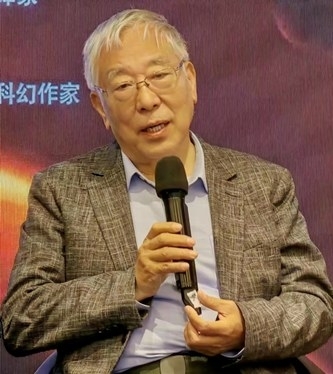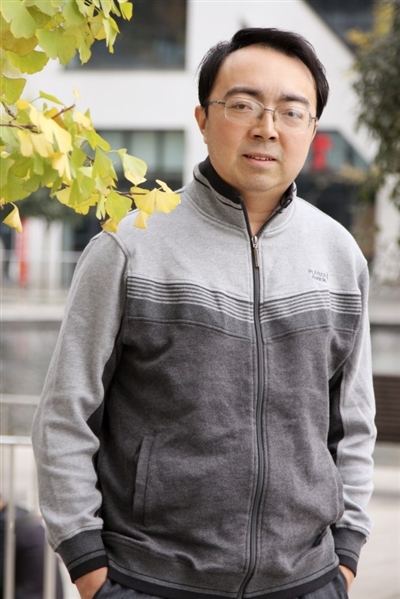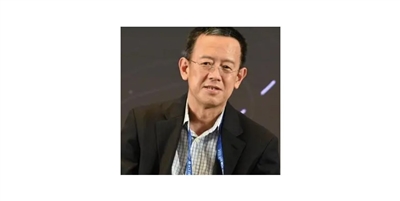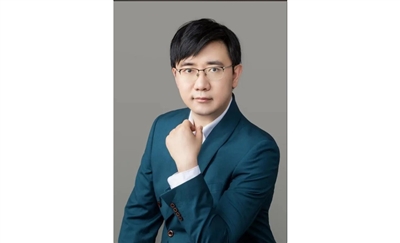■ Qu Jingfan
With the global success of Liu Cixin’s The Three-Body Problem (《三体》) and the release of its Netflix adaptation, Chinese science fiction is experiencing a surge in popularity abroad. The genre’s content has expanded from hard sci-fi and cyberpunk to dystopian narratives, showcasing a dynamic and vibrant landscape. Among the many illustrious figures in Chinese sci-fi, Wang Jinkang, He Xi, Han Song, Bao Shu, and Shuang Chimu stand out as notable representatives.
Wang Jinkang
Born in 1948 in Nanyang, Henan, Wang Jinkang has rich working experiences as he worked as a wood modeler in a factory in 1968. In 1978, he pursued higher education at Xi’an Jiaotong University, majoring in Internal Combustion Engines. Then, he became the deputy director and senior engineer at the Nanyang Oilfield Petroleum Machinery Plant Research Institute. Nowadays, Wang Jinkang is a member of the China Writers Association, the China Science Writers Association, and a committee member for the Science and Literature Committee of the China Science Writers Association.
Wang Jinkang has won the prestigious Galaxy Award for Chinese Sci-Fi 15 times. Wang’s debut work, Adam’s Regression (《亚当回归》), won the top prize in a national sci-fi writing contest in 1993. His notable novels include The Humanoid (《类人》) and Ant Life (《蚁生》). In 2024, Seeds of Mercury (《水星播种》was shortlisted for the 2024 Hugo Award for Best Novel and Novella and it was translated by Alex Woodend and published by Flame Tree Press in 2023, drawing widespread international attention.
Wang’s writing is marked by a philosophical depth and a sense of searching for roots, with a tone that is often somber and melancholic. His elegant and fluent language, combined with intricate structures and a knack for suspense, make his works highly attractive. His stories often exhibit remarkable foresight. For example, his early works like Seven Shells bear similarities to the film Inception, while Life and Death Balance (《生死平衡》) and Cross (《十字》) have some plots that resemble the COVID-19 pandemic, demonstrating the important social function of sci-fi.
Wang Jinkang believes that a good sci-fi should be conceived based on certain criteria, including that the conception must be scientifically impactful, be logically coherent, and have a solid scientific core that is scientifically accurate.
He Xi
Born in 1971 in Sichuan, He Xi, whose real name is He Hongwei, is a representative of China’s “New Generation” of sci-fi writers, a member of the China Writers Association and the Sichuan Writers Association as well. As a lifelong fan of sci-fi, He Xi began writing this genre in 1991, focusing on exploring the future of macro science and the good and evil of human nature. His works cover a wide range of scientific fields and themes such as love, detective fiction, and suspense.
He Xi has won the Galaxy Award for Chinese Sci-Fi 13 times. His notable works include The Six Paths of Lives (《六道众生》) and Sad People (《伤心者》). His novel Life Does Not Allow Us to Meet (《人生不相见》) was shortlisted for the Hugo Award for Best Novel and Novella.
He Xi’s sci-fi creation is influenced by writers such as Isaac Asimov and Ye Yonglie. He published his first sci-fi novel at the age of 19, and his works now cover various themes such as space exploration, time travel, and parallel universes. In the preface to He Xi’s novel The Doomed Year (《天年》), Liu Cixin wrote , “We can be struck by the imagination and creativity in one sci-fi novel, find deep philosophy in another, and be captivated by a third’s intricate and clever storytelling. But to experience all these in a single novel, you have to read He Xi.”
He Xi’s works depict a near future, requiring a balance between presenting a sense of the future and adhering to universal scientific principles. He also pointed that Chinese sci-fi faces greater challenges in translation compared to traditional literature, with a severe shortage of excellent translators.
Shuang Chimu
Shuang Chimu, whose real name is Feng Yuan, is an emerging sci-fi author born in the 1980s. She is a lecturer at Nankai University’s Department of Philosophy and holds an academic Master’s Degree from Radboud University in the Netherlands. She is currently pursuing a Ph.D. in Philosophy at Renmin University of China. She was nominated by the Readers’ Choice Award of the 2008 Galaxy Award. Her notable works include Rooster Prince (《公鸡王子》), The Lynx School (《猞猁学派》), and The Smart Mask (《智能的面具》).
Like many of her generation, Shuang Chimu developed a love for sci-fi from reading Doraemon. Her earliest work, Gene Source (《基因源》), was published in Science Fiction World (《科幻世界》) in 2008. She has been an avid reader of Sci-Fi World since middle school, where she “met” numerous Chinese and foreign sci-fi writers.
Shuang Chimu’s works incorporate certain traditional sci-fi elements. Her stories, such as Space Go (《空间围棋》), Rooster Prince, and The Lynx School, often feature grand future visions, exploring issues like algorithms, human-machine interfaces, and 3D printing. At the same time, she challenges increasingly rigid genre narratives. The time of her stories is not limited to the future and her language is crafted with a classical touch, making her writing as polished as that of her peers in literary journals. She focuses more on creative ideas and inspirational stories, which are the two elements essential for writing sci-fi in her opinion.
Han Song
Born in Chongqing, Han Song studied English and Journalism at Wuhan University from 1984 to 1991, earning a Bachelor’s Degree in Literature and a Master’s Degree in Law. In 1991, he joined Xinhua News Agency. He is a standing director of the China Science Writers Association and a member of the China Writers Association.
Han Song has won multiple Galaxy Awards, Huayu Nebula Awards, and World Chinese Sci-Fi Art Awards. His notable works include Subway (《地铁》), Hospital (《医院》), Red Ocean (《红色海洋》), 2066: Red Star Over America (《火星照耀美国》), and Gravestone of the Universe (《宇宙墓碑》). In 2024, his short story Answerless Journey (《没有答案的航程》) was shortlisted for the 2024 Hugo Award for Best Short Story.
In middle school, Han participated in a sci-fi writing contest, winning a large collection of sci-fi books as a prize, which opened a new world for him. Han Song believes that sci-fi must interact with reality and engage with the real issues facing the nation and society. For example, the inspiration for Subway came from the overcrowding problem in subways, while Exorcism (《驱魔》) addresses the apocalyptic crises brought about by advanced technologies. Meantime, he believes that the most appealing aspect of sci-fi lies in its sense of wonder and estrangement, transcending everyday experiences and writing sci-fi requires an expansive imagination. For example, his work 2066: Red Star Over America, created in the 1990s, predicted events like the attack on the World Trade Center and a severe financial crisis in the United States, these all materialized in real life later.
Bao Shu
Bao Shu, whose real name is Li Jun, is an author born in the 1980s who graduated from Peking University’s Department of Philosophy and later pursued a Master’s Degree at KU Leuven in Belgium. He currently resides in Xi’an, focusing on his writing. Bao Shu has won multiple Nebula Awards for Sci-Fi and Fantasy in Chinese and Galaxy Awards for Chinese Sci-Fi. His notable works include Three Body X: Aeon of Contemplation (《三体X:观想之宙》), The Song of Ancient Earth (《古老的地球之歌》), and Ruins of Time (《时间之墟》). His short story Tasting the Future Delicacy Three Times (《美食三品》) was shortlisted for the 2024 Hugo Award for Best Short Story.
In 2010, Bao Shu completed Three Body X: Aeon of Contemplation, a fan fiction of The Three-Body Problem within just over 10 days. He posted it on forums like Shuimu Tsinghua and Baidu Post Bar, marking his debut in the sci-fi community. He then rapidly produced a series of high-quality sci-fi stories, each more impressive than the last.
Bao Shu has loved reading sci-fi since childhood. His works are humorous and witty, filled with intellectual satire and deep reflections on time, future, universe, and the life. In addition to writing, he enjoys reading, traveling, and exploring culinary delights. In Tasting the Future Delicacy Three Times, he uses his imagination to create stunning scenes, such as tasting food with brainwaves, a doomsday scenario controlled by money, and eternal imprisonment for criminals. He reshapes the universe, time and space and the world through these wonderful stories.







